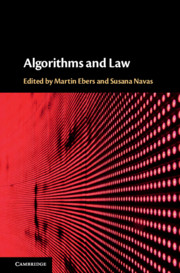Book contents
- Algorithms and Law
- Algorithms and Law
- Copyright page
- Contents
- List of Figures and Tables
- Notes on Contributors
- Preface
- Acknowledgments
- 1 Robotics and Artificial Intelligence
- 2 Regulating AI and Robotics
- 3 Regulating Algorithms
- 4 Automated Decision-Making under Article 22 GDPR
- 5 Robot Machines and Civil Liability
- 6 Extra-Contractual Liability for Wrongs Committed by Autonomous Systems
- 7 Control of Algorithms in Financial Markets
- 8 Creativity of Algorithms and Copyright Law
- 9 “Wake Neutrality” of Artificial Intelligence Devices
- 10 The (Envisaged) Legal Framework for Commercialisation of Digital Data within the EU
10 - The (Envisaged) Legal Framework for Commercialisation of Digital Data within the EU
Data Protection Law and Data Economic Law As a Conflicted Basis for Algorithm-Based Products and Services
Published online by Cambridge University Press: 04 July 2020
- Algorithms and Law
- Algorithms and Law
- Copyright page
- Contents
- List of Figures and Tables
- Notes on Contributors
- Preface
- Acknowledgments
- 1 Robotics and Artificial Intelligence
- 2 Regulating AI and Robotics
- 3 Regulating Algorithms
- 4 Automated Decision-Making under Article 22 GDPR
- 5 Robot Machines and Civil Liability
- 6 Extra-Contractual Liability for Wrongs Committed by Autonomous Systems
- 7 Control of Algorithms in Financial Markets
- 8 Creativity of Algorithms and Copyright Law
- 9 “Wake Neutrality” of Artificial Intelligence Devices
- 10 The (Envisaged) Legal Framework for Commercialisation of Digital Data within the EU
Summary
Nowadays everything revolves around digital data. They are, however, difficult to capture in legal terms due to their great variety. They may be either valuable goods or completely useless. They may be regarded as syntactic or semantic. However, it is the particularly sensitive data protected by data protection law that are highly valuable and interesting for data-trading, big-data and artificial-intelligence applications in the European data market. The European legislator appears to favour both a high level of protection of personal data, including the principle of ‘data minimisation’, and a free flow of data. The GDPR includes some free-flow elements, but especially legislation on trading and usage of non-personal data is currently under discussion. The European legislator faces key challenges regarding the (partly) conflicting objectives reflected in data protection law and data economic law. This contribution assesses the current state of legal discussions and legislative initiatives at the European level.
Keywords
- Type
- Chapter
- Information
- Algorithms and Law , pp. 269 - 298Publisher: Cambridge University PressPrint publication year: 2020
- 2
- Cited by

